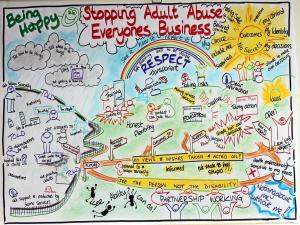Safeguarding Adults Reviews (SARs)
Learning from Safeguarding Adults Reviews
The Care Act 2014 includes a requirement for Safeguarding Adults Boards to hold Safeguarding Adults Reviews in certain circumstances and for partners to co-operate in the process. Following the implementation of the Act, ‘Safeguarding Adults Review’ replaces the term ‘Serious Case Review’.
Safeguarding Adults Reviews (SARs) provide an opportunity to improve inter-agency working by identifying and disseminating learning from incidents, sharing best practice and ultimately better safeguarding adults at risk of abuse and neglect.
A Safeguarding Adults Review is a multi-agency process to consider whether or not serious harm experienced by an adult with care and support needs could have been prevented, it makes recommendations to minimise the risk of a repeat occurrence. The main aim is to ensure that learning is disseminated across all organisations to improve practice and to deliver better outcomes for people with care and support needs.

SCIE SARs LIBRARY.
An online library of open access resources on the SCIE website containing reviews, reports, guidance and tools to support practitioners working in safeguarding. National safeguarding networks will be involved to ensure that stakeholder views and knowledge are represented in the development of the resources.
The space is open access to SAR reports alongside a search function to support easy navigation.
Overview of the SARs library project
The sector has long demanded a library of Safeguarding Adults Review (SAR) reports. The Department of Health has commissioned SCIE and RiPfA to develop this resource. The aim is to maximise the value of individual SARs through two different kinds of resource. One will support the quality of individual SARs and the other will enable more widespread and effective use of the learning from SARs. This will support a virtuous circle whereby as the quality of individual SARs goes up, it also supports their being used to better effect.
What are we doing?
In the use strand we will be:
- bringing together all published SAR reports
- developing a category scheme to make the SARs library searchable
- producing a one-off collation of the learning captured in SAR reports
- bringing together and signposting other SAR-related research
In the quality strand we will be:
- adapting the Serious Case Review quality markers developed by SCIE, for adult safeguarding
- producing a one-off report on the kind of learning SARs reports are currently capturing and how easy is it to identify
Who is involved?
The library is being developed jointly by Research in Practice for Adults (RiPfA) and Social Care Institute for Excellence (SCIE), working closely with colleagues from the sector.
RiPfA and SCIE are pleased to be working with the Social Care Workforce Research Unit (SCWRU) at King’s College London on this project. The work of the SCWRU on SARs and SCRs is funded by the Department of Health’s Policy Research Programme.
The SAR library project is designed to bring together, build on and add value to relevant SAR activity that colleagues are already undertaking. Resource development is involving SAB chairs, SAB managers and agency safeguarding leads.
FAMILY & FRIENDS
WSAPB also wants to hear from family and friends. If your loved one is subject to a SAR, you will be contacted by the Local Area Safeguarding Adults Board Manager. They will act as a single point of contact supporting you through the review process and ensuring that you have a voice. Below is a leaflet that explains the SAR process;
Wirral SAR Booklet For Families
SAR PROCEDURE
The SAR subgroup will consider each referral in line with the legislation. A SAR Procedure has also been developed for the group to work to, this is reviewed on an annual basis or more frequently if a need is identified.
